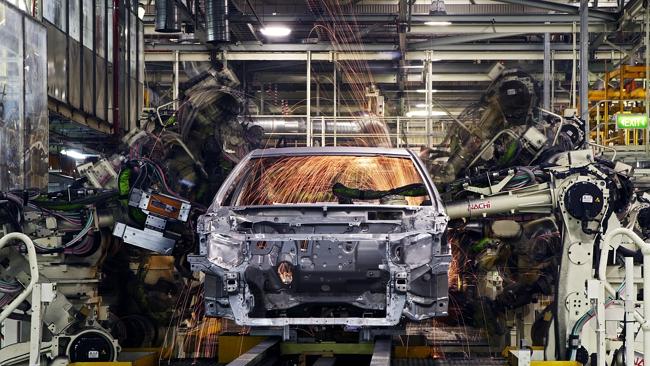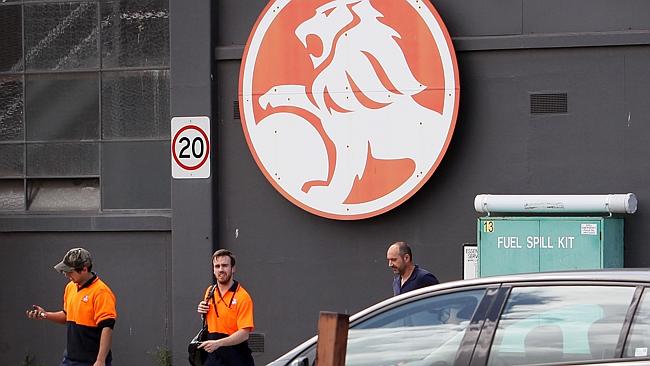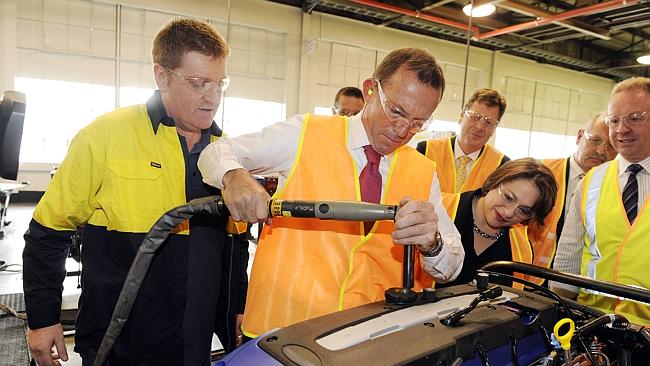Will it be easy for thousands of Toyota, Holden and Ford workers to find new careers?
THOUSANDS of auto workers will be left without a job due to Toyota, Ford and Holden pulling out of the country. How hard will it be to transition to a whole new career?
IN THREE years there will be more than 6600 auto workers out of a job in an industry that will cease to exist. That figure rises to 50,000 once related industries such as component manufacturing are taken into account.
And while the robust mud-slinging and blame-shifting is in full-force between the federal Coalition government and the Labor opposition and unions, it will be of cold-comfort to the thousands of workers whose specialist skills will be largely redundant soon.
Prime Minister Tony Abbott has said there are “better days” ahead for auto workers but is it actually that easy to transition from one career to another?
Unlike previous auto pullouts, there is no industry left, no rival company to take you on.
When 1000 Mitsubishi workers were made redundant in the mid-noughties, after two years, only a third of them were in full time employment, according to a Flinders University study. Another third were in part-time or casual positions while the remainder were unemployed.
RELATED: TOYOTA ALTONA SHUTDOWN TO HIT 50,000 JOBS
No doubt there are challenges ahead for the thousands of soon-to-be retrenched workers in the perfect storm of Ford, Holden and Toyota ceasing local operations within a year. Education and retraining plus psychological support will be crucial. Particularly for older workers who have been in the job for decades and may not possess the digital skills of the new economy.

Mark Burnicle, director of human resources firm People Net, said: “The government is right that people can retrain and transition but it’s not that simple. Each person will have their own individual and emotional circumstances.
RELATED: TOYOTA COMPLETES CAR INDUSTRY DEMISE
“[Losing your job] is like a grieving process and people go through it at different speeds. There’s a sense of losing control. Key to this will be empowering those people to get the job they want and not just jump into something that they don’t really want or give them that sense of respect and being valued.”
Alexandra Stillwell, a manager of organisational development at Stillwell Management Consultants and senior registered organisational psychologist, workers’ concept of social identity will be challenged. But, she said, for some it will represent a positive fresh start and give them the opportunity to try a new area such as starting a business or taking on a franchise.
She added there are three main areas of training retrenched workers might need to go through: job search techniques (especially for those who may not have updated their resumes or being to an interview in years), vocational training and self-employment training.
Vocational training could include upskilling and reskilling while self-employment training would deal with the risks and rewards of small business.

She said: “[The workers] should be encouraged to think very broadly and creatively about where to look for jobs, the areas that might be suitable.
“Start now in terms of doing research into industries that are employing, where the opportunities are, where they can find assistance and the networks which can help them.
“For those who have the right technology skills, or could learn them, there are opportunities growing in advanced technology and lean manufacturing, areas Australia has really invested in.”
Psychologist Claudia Hounslow from Life Resolutions warned that expectations to learn a new skill in an increasingly competitive environment is tough and is a difficult time for a lot people. She argued that access to long-term specialist support is necessary for those affected by the upheavals.
RELATED: HOLDEN TO END MANUFACTURING IN AUSTRALIA
Mr Burnicle added support from the executives and management of the auto companies will be crucial. He said: “A lot of it is about leadership, and that’s not just what the government can do. What Toyota will have to do is be supportive and guide their employees through the process.”
He said the retraining and transition process and how long it will take to land another job will very much depend on individual circumstances.
“It depends on their emotional stability and being ready for it, and I can’t stress the importance of getting that right,” he said. “If they’re willing to take on new skills and training, and with the lead-in people have they should be able to do that.”
Online jobs site Seek’s HR manager, Rebecca Supierz, said now is the time for those workers to identify key transferable skills and identify what aspects of the job they really love.

Any promises of government support to help transition workers remain vague. After Holden announced its decision to exit in December, the Abbott Government unveiled a $100 million package to assist automotive workers in Victoria and South Australia. Details of the package were sketchy other than that it will support job-creation projects.
RELATED: FORD WILL SHUT FACTORIES BY 2016
The government has said it will consider similar proposals for Toyota workers.
But the true economic and emotional toil of the end of a 66-year old industry won’t be known for years. The Opposition industry spokesman Kim Carr warned the economic impact to Victoria and South Australia would be akin to the Great Depression of the 1930s.
“There are going to be families that won’t be able to get work. There will be whole communities that will be savaged by this decision.”
###




